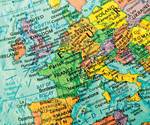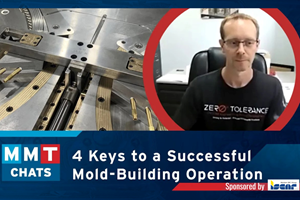Int'l Perspective: Think Global, Act Local, and Cooperate
The new generation of company owners and managers count on cooperation with other mold shops or even competitors in order to remain globally competitive, and the moldmaking business is an increasingly global one.
There is a paradigm shift in the European tool and moldmaking industry, believes professor Thomas Seul, vice president for research and transfer at the University of Applied Science in Schmalkalden, Germany, and president of the Association of German Tool and Mould Makers (VDWF). Just 20 years ago, tool and moldmaking companies in Germany and Europe were all watching each other closely, but everyone was fighting their own battles. Today, this competition is more or less a thing of the past, because there is a generational change happening. The new generation of company owners and managers count on cooperation with other mold shops or even competitors in order to remain globally competitive, and the moldmaking business is an increasingly global one, Seul believes. Companies have to increasingly “think global, act local” and find local partners in booming markets such as Mexico or Asia. I recently spoke with Seul about this topic to get his viewpoints.
You have been very with familiar the German and European moldmaking industries for a long time now. What are some strategies for remaining competitive that apply equally to German and American shops?
Professor Thomas Seul: I believe that it doesn’t matter whether you are making tools or molds in Germany, other European countries or the United States. Germany, like the U.S., has a big domestic market but is also facing globalization issues, such as competition from low-cost countries, price competition, increasing demands on product quality, as well as increasingly complex tools. In my opinion, there are three strategies: 1) cooperative manufacturing, which allows shops to open up new and bigger markets; 2) optimization of internal processes to ensure the best service and on-time delivery; and 3) Toolmaking or Industry 4.0.
Can you elaborate more on cooperative manufacturing strategies?
Seul: There is a new generation of company owners and managers today that recognizes the importance of partnerships and capacity-sharing with other mold shops that might sometimes be competitors, because others’ capabilities and capacities might complement both businesses. The “older” generation, which is slowly handing over the business to its children, has not been very open to sharing its knowledge or capacities with competitors in the past. Today, people have different mindsets. The younger generation is more open to share capacities and to network.
Can you provide an example of this cooperative manufacturing?
Seul: One in particular is Eisenach-based moldmaker Gezea. Henning Köllner, who took the company over from his father not long ago, is an advocate of forming clusters within the tool and moldmaking sector to eliminate bottlenecks and benefit from each company’s specific expertise. He is working closely with Werkzeugbau Ruhla in Seebach, Germany, to manufacture complete tools or electrodes for them, if necessary.
Do you have an example of Industry 4.0 in practice?
Seul: Yes. Germany’s Toolmaker of the Year (an annual award presented by a jury in Aachen), Phoenix Contact’s tool shop. The shop runs several automated cells that include milling and EDM, and has embraced the idea of maximum visibility and transparency. It is today probably one of the most advanced and sophisticated tool and moldmaking shops in Germany. Digital touchscreens in the factory ensure all processes are transparent and visible for everyone in real time. All machines and departments are networked via a manufacturing execution system (MES) and a systems, applications and products (SAP) system. MES is a control system for managing and monitoring work in process, and a SAP system deals with data security and integrity. Phoenix runs a first-in-first-out concept, managing to reduce lead times by as much as 50 percent. However, before digitizing its whole shop, and before automation systems or an optimized product flow system were installed and realized, Phoenix looked at each single manufacturing step and analyzed and optimized all processes before networking the machines via MES and SAP and digitizing the system. The result is fast turnaround times for its customers, even for complex tools.
What do you mean by complex tools?
Seul: There is currently a trend towards product diversification and increasing complexity, whether in the large electrical, appliance, telecommunications, automotive or medical industries. Take the Audi radiator grill, for example. There are 14 different versions for the A4 model alone, and all have to be injection-molded with two molds, as 14 different molds would not be efficient enough, of course. These tools then have to be flexible enough to change from one version to another during the injection molding process, from shot to shot, depending on the order.
How do highly skilled people factor into understanding customer demands and meeting their requirements?
Seul: Toolmakers are an essential part of a shop’s core competencies, which is what you can’t buy. You can buy machines, you can automate and optimize your processes as described earlier, you can acquire other companies to expand capabilities, and so forth. But you cannot buy people. Phoenix Contact’s tool shop wouldn’t be where it is today without its head, Ralf Gärtner, who is enthusiastic, clever and, most of all, 100-percent dedicated to what he does. That’s the key above all.
Related Content
MMT Chats: 4 Keys to a Successful Mold-Building Operation: Innovation, Transparency, Accessibility and Relationship
MoldMaking Technology Editorial Director Christina Fuges chats with Steve Michon, co-owner of Zero Tolerance in Clinton Township, Michigan, about the excitement of solving problems, the benefits of showing gratitude, the real struggle with delegation and the importance of staying on top of technology. This episode is brought to you by ISCAR with New Ideas for Machining Intelligently.
Read MoreMaking Quick and Easy Kaizen Work for Your Shop
Within each person is unlimited creative potential to improve shop operations.
Read MoreMMT Chats: Solving Schedule and Capacity Challenges With ERP
For this MMT Chat, my guests hail from Omega Tool of Menomonee Falls, Wisconsin, who share their journey with using enterprise resource planning (ERP)—and their people—to solve their schedule and capacity load monitoring challenges.
Read MoreTop 10 Topics to Cover During an ISO 9001 Manufacturing Audit
Take a look at this practical hands-on approach to conducting a quality audit.
Read MoreRead Next
Int'l Perspective: European Trend Report - Optimism Prevails
The heads of several overseas manufacturing groups expect continued growth this year.
Read MoreHow to Use Continuing Education to Remain Competitive in Moldmaking
Continued training helps moldmakers make tooling decisions and properly use the latest cutting tool to efficiently machine high-quality molds.
Read MoreReasons to Use Fiber Lasers for Mold Cleaning
Fiber lasers offer a simplicity, speed, control and portability, minimizing mold cleaning risks.
Read More





















